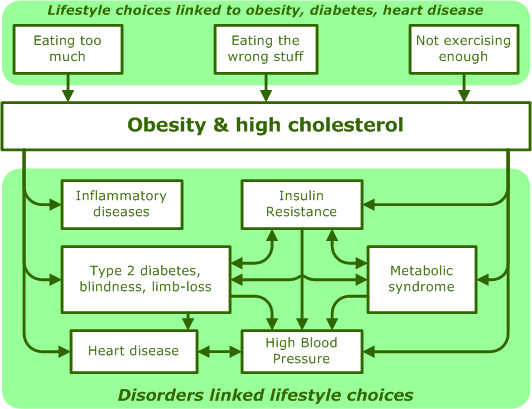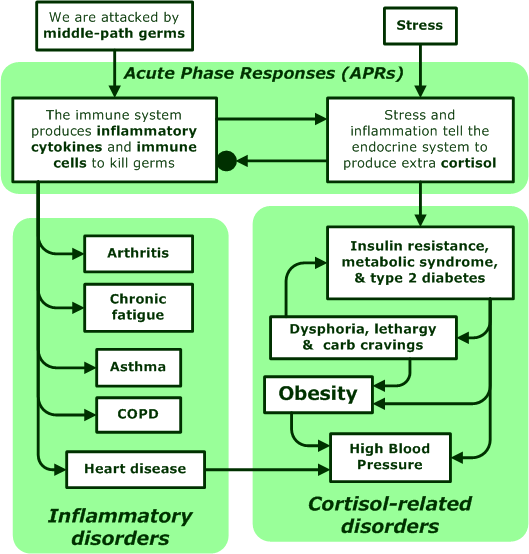How disease models affect treatments
We all carry "disease models" in our heads to explain why we get sick. Usually these models are not carefully thought out or researched, but still they guide our decisions on diet and exercise. More importantly, disease models guide the decisions our doctors make about the treatments we get.
Two very different models are compared below.
The lifestyle model. The prevailing disease model in Western countries is the lifestyle model. This model says that most of your health problems are your fault; if you didn't eat so much, if you ate more fruits and vegetables, if you weren't so lazy, then you'd be slim and healthy. I've never found an official diagram of this model, but the drawing below shows its main features.

The lifestyle model is based on Medieval ideas of morality and justice, not on science. Several books have been written about its flaws, but I will just touch on a few of hem here:
- Overeating and underexercising are treated as primary causes, but they are really symptoms of disease, not causes.
- The lifestyle model relies on magic, not science, to explain the inflammatory diseases that accompany obesity, diabetes, and heart disease.
- Insulin resistance and metabolic syndrome don't follow obesity, they precede it (see Reaven's classic book Syndrome X).
- There is no rational explanation for the seamless progression from insulin resistance through metabolic syndrome to type 2 diabetes.
- Obesity, diabetes, and heart disease are thought of as behavioral problems, so treatment failures tend to be blamed on patients. Consequently, there is seldom any deep rethinking of the theories behind the treatments.
Treatments based on the lifestyle model are worthless. The NIH, after actively promoting the lifestyle model for fifty years, says we are having obesity and diabetes epidemics. Heart disease remains the number one killer in western countries.
Books, magazines, and television have hammered the lifestyle model into our heads for fifty years, and not one person in a hundred doubts that it is true. I believed it for most of my life, and I would believe it today if a heart attack hadn't opened my eyes. It is almost certainly the model that your doctor uses when choosing treatments for you.
The Infection-cortisol model. The infection-cortisol model was first proposed by AIDS researchers in 1986, and I stumbled on to it in 1999. It gives a reasonable explanation of how we develop obesity, diabetes, and heart disease. Its main features are shown below.

The infection-cortisol model has many advantages over the lifestyle model, but I will only cover a few of them here.
- Acute phase responses explain the inflammatory and metabolic diseases that accompany obesity, diabetes, and heart disease.
- Excess cortisol explains the smooth progression from insulin resistance to metabolic syndrome to type 2 diabetes. All three disorders resemble Cushing's syndrome, which is known to be caused by excess cortisol.
- Treatment failures cannot be blamed on patients, so treatment theories must be rethought when they fail.
The infection-cortisol model says that most of your health problems are caused by infections, not by gluttony or sloth. It says that if you were healthy you would eat less, and you would prefer fruits and vegetables to donuts. It also says that if you were well you would get all of the exercise you need.
Most importantly, the infection-cortisol model says that eradicating a few chronic infections could eliminate a large number of symptoms, including obesity, diabetes, and heart disease.
The best argument against the infection-cortisol model is that it is untested; there is no long history of successes to point to. On the other hand, there is no fifty-year history of failure, either.
As it is presented here, the infection-cortisol model focuses on obesity, diabetes, and heart disease. My reading indicates that it can be expanded to explain most inflammatory and metabolic diseases.
Deciding which model to use. If you have a chronic disease that has been treated for years, and you're not getting well, you need to study both of the models presented above. Discuss them with your doctor, and pick the one that you think will give you the best chance of living long and well.
If you pick the infection-cortisol model, and your present doctor will not make a serious effort to eradicate your chronic infections, then you need to retrain or replace your doctor (Click on Doctors at the left).
Two good questions. Two good questions to ask here would be: Why devote all of this attention to disease models? Wouldn't it be better to focus on health models?
It would better to use health models, if we had any. But we know more about disease than we know about health, so for the time being we are stuck with using disease models.
Summary
Although they have been practiced and refined for fifty years, treatments based on the lifestyle model have not cured obesity, diabetes, or any other disease.
The treatments suggested by the infection-cortisol model are difficult and must be overseen by skilled physicians. There is, so far, no proof of their safety or effectiveness. It is hard to imagine, though, that they could be more dangerous or less effective than treatments based on the lifestyle mode.
Disclaimer
www.potbellysyndrome.com is owned and maintained by Russell Farris, and the information contained here is based upon the research and personal and professional experiences of Russell Farris. It is not intended as a substitute for consulting with your physician or other health care provider. Any attempt to diagnose and treat an illness should be done under the direction of a health care professional.
Russell Farris does not advocate the use of any particular health care protocol but believes the information in this website should be available to the public. Russell Farris is not responsible for any adverse effects or consequences resulting from the use of the suggestions, preparations, or procedures discussed in this website. Should the reader have any questions concerning the appropriateness of any procedures or preparation mentioned, the website owner strongly suggests consulting a professional health care advisor.
